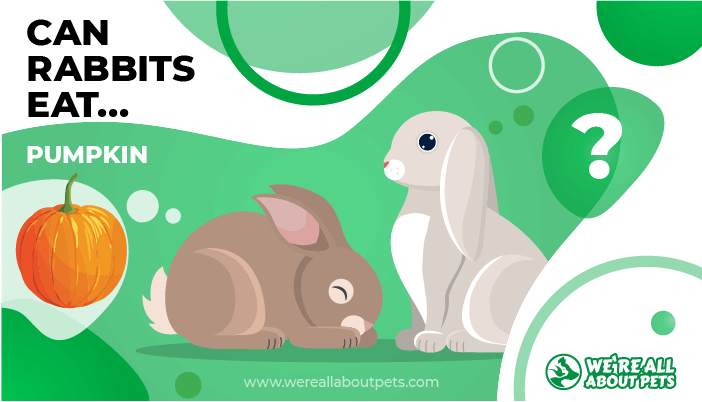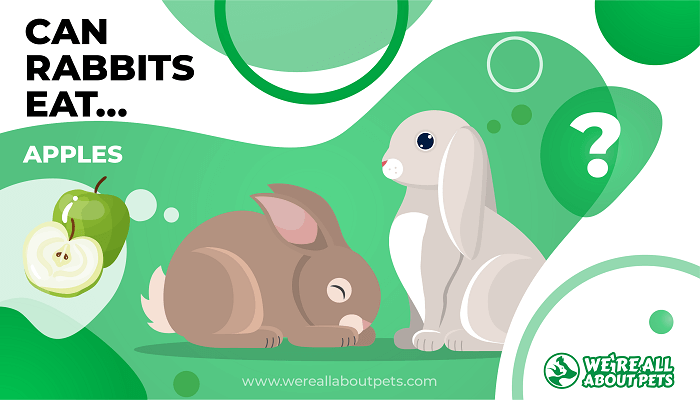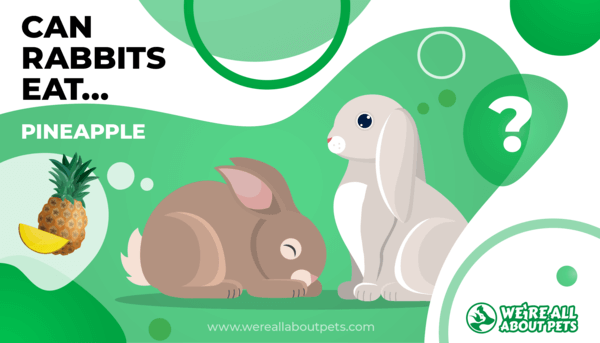Can Rabbits Eat Cherries?
This page contains affiliate links. We may earn money or products from the companies mentioned in this post through our independently chosen links, which earn us a commission. Learn More
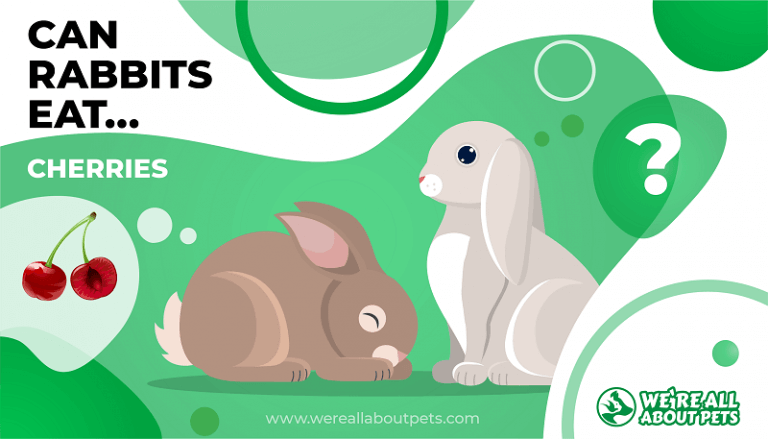
Sweet, juicy, and delicious, cherries are a favorite summertime treat. If you happen to have some fresh cherries on hand, you’re probably wondering whether you can share them with your bunny.
But can rabbits have cherries if so, how many can they have, and how often should they eat them?
In case your bunny has already eaten the cherry or if you’re simply looking for a quick answer, here it is: Yes! Rabbits can eat cherries. But there are definitely limits to the number of cherries a rabbit can eat as well as how often they can enjoy this very special treat.
Stick with us, because were about to tell you everything there is to know about cherries for rabbits.
Cherries Nutrition Stats
The rich red color of cherries is an indicator that these sweet fruits are burning with antioxidants.
A 1 cup serving of right, sweet cherries with the pits offers you approximately:
- 87 calories
- 1 g carbohydrates
- 9 g fiber
- 5 g protein
- .3 g fat
Cherries Nutritional Facts

Even though cherries are so sweet and delicious they are really good for you. Even though your bunny can’t eat many, cherries are a fairly healthy treat that your rabbit will certainly enjoy.
That same 1 cup serving of sweet, bright cherries gives you about:
- 3 iu vitamin A
- 306 mg potassium
- 7 mg vitamin C
- .1 mg vitamin B6
- .1 mg manganese
- 2 mg magnesium
- .3 mg pantothenic acid
- .1 mg copper
- 4 mg choline
- 9 mcg vitamin K
- 9 mg calcium
- 29 mg phosphorus
Can Rabbits Have Cherries?
Yes! Rabbits can have cherries. These – and other sweet fruits – shouldn’t make up a major part of your bunny’s diet, but they’re perfectly fine for occasional enjoyment.
You should be careful about how you feed cherries to your rabbit. Because the pits are very hard, they can damage your bunny’s teeth. If your rabbit accidentally swallows a cherry pit it can cause serious digestive problems.
In addition, cherry pits contain a small amount of cyanide which is poisonous to rabbits.
Are Cherries Good For Rabbits?
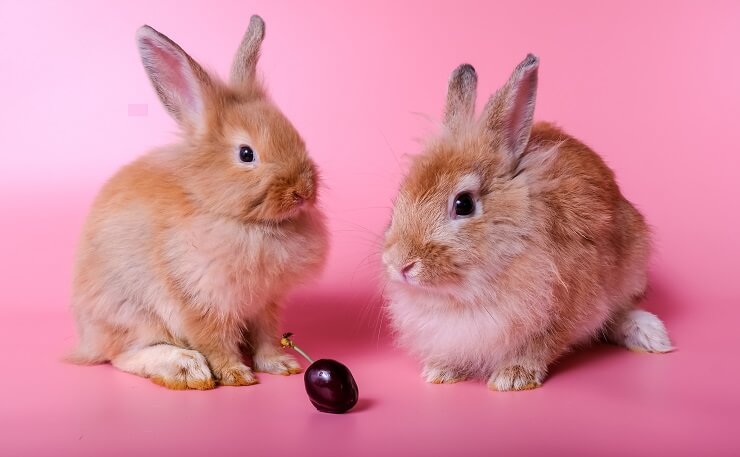
Absolutely! Even though your bunny can’t eat cherry pits, the fruit itself is pretty good for your rabbit. Since it offers plenty of nutrients it can support your rabbit’s overall well-being.
Just remember that it’s important to offer you rabbit only a small amount of cherry. Too much can be harmful.
Do Rabbits Like Cherries?
Most rabbits love cherries! Many like them so much that they’ll beg for more. Even though your bunny looks adorable and seems to plead with you, don’t give in!
Too much sugar can give your bunny an upset tummy.
How Many Cherries Can A Rabbit Eat?
That’s a great question and we’re glad you asked!
Here’s how many cherries to feed your rabbit:
| Age | Amount |
| Baby rabbits | None |
| Juvenile rabbits | None |
| Adult rabbits | 1 large cherry or 2 small cherries |
Just like any other time you offer your rabbit a new food you should take a gradual approach when feeding cherries, so your rabbit has a lower risk of side effects.
Start out by offering your rabbit about half a cherry with the pit taken out. Don’t give them any more than that, unless they are already familiar with sweet fruits.
Over the next 24 hours, keep an eye on your rabbit. Watch for signs of an upset tummy, bloating, or diarrhea. If any of these issues arise, your rabbits digestive system probably can’t handle cherries and you shouldn’t give them to your bunny again.
If everything goes smoothly though, you can give your rabbit a whole cherry next time this treat is on their menu.
How Often Can A Rabbit Eat Cherries?
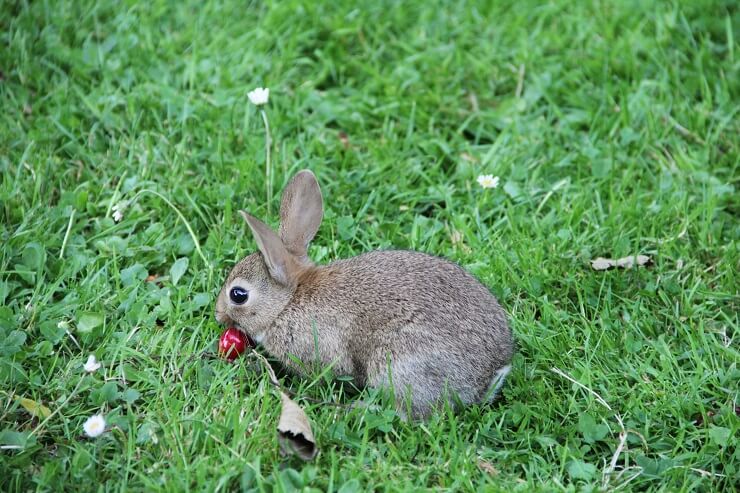
You can give your rabbit a cherry or two once or twice per week, but never on the same day as you offer other fruits or high sugar vegetables.
If you want to give your rabbit a selection of fruits all on the same day, it’s important to reduce the serving size of each one so that the total amount of fruit you’re giving your bunny amounts to no more than 1 teaspoon of fruit per 2 pounds of your rabbits body weight.
The Correct Diet Is Important
Now that you know that cherries can’t be part of your rabbits every day diet, you might be wondering: “What do rabbits eat?”
Wild rabbits enjoy a diet that consists mostly of long stemmed grasses and low-lying plants. If given the chance, they’ll happily raid gardens and nibble at vegetables.
Since you probably don’t have much time to pick lots of fresh grass for your bunny, you’ll want to provide them with an unlimited supply of hay. Just like the grass that makes up most of rabbit’s natural diet, hay helps keep your bunny’s digestive system moving.
In addition to hay, here’s what to feed your rabbit every day.
- Balanced rabbit food is an everyday essential, since it contains all the nutrients your bunny needs for good health. The package should have a guide to feeding your rabbit the right amount based on age and size.
- Fresh leafy greens and crunchy veggies round out your rabbit’s diet while making life more interesting. Each day, you should offer your rabbit about one cup of leafy greens plus one tablespoon of crunchy veggies per two pounds of body weight.
- Very small amounts of fruit (like cherries!) are nice treats that your rabbit can enjoy as a small percentage of their overall intake. Offer them approximately 1 teaspoon of fruit per 2 pounds of body weight.
Remember to rinse and refill your rabbit’s water bottle on a daily basis so that they never run out of clean, fresh water.
That’s not all: since rabbits teeth never stop growing, it’s important to provide them with something to chew at all times. Rabbit toys are ideal, and so are items such as coconut shells, untreated softwood sticks, and slices of unbleached loofah.
What Are Other Healthy Alternatives To Cherries In A Rabbit’s Diet?
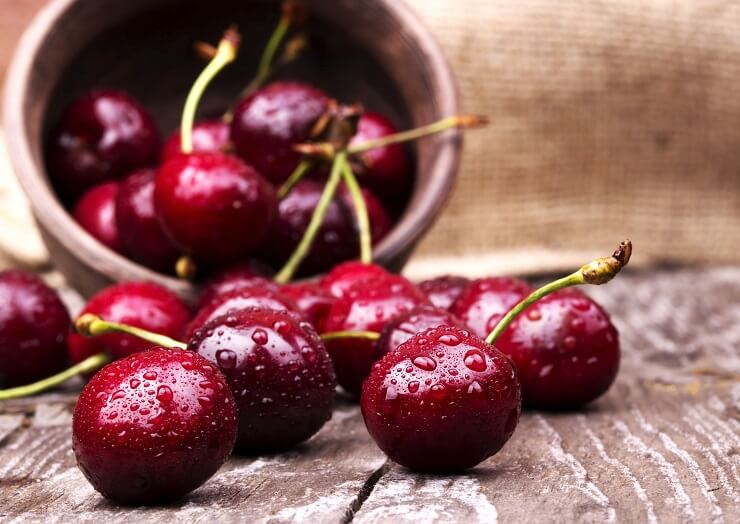
Even though your rabbit can’t eat cherries by the bushel, there are plenty of other healthy treats for them to try. Here’s a quick list of rabbit-approved vegetables that your bunny should enjoy.
- parsley
- cilantro
- basil
- carrot tops
- swiss chard
- beet greens
- radish tops
- spinach
- arugula
- romaine lettuce
- butter lettuce
- cabbage
- broccoli
- dandelion greens
- endive
- escarole
- fennel
- bok choy
- yu choy
- apples
- blackberries
- blueberries
- raspberries
- banana
- kale
- carrots
- bell peppers
Remember to check for information about every new food you feed your rabbit. It’s really important to make sure that all items are safe and to ensure that your offering your bunny the correct serving size.
For now though, try giving your rabbit cherry and see how they like it!
This is a fun treat that your bunny will almost certainly appreciate.
Frequently Asked Questions
Are cherries safe for rabbits?
Yes, cherries are safe for your rabbit to eat. Just remember to remove the pits!
Can cherries make my rabbit sick?
Yes, but only if you offer too many at once or if you forget to introduce cherries a little at a time.
Can rabbits eat cherry leaves?
No! Cherry leaves contain cyanide so they are toxic to rabbits. Never give cherry leaves to a rabbit.
Can rabbits eat canned cherries?
No - canned cherries are cooked, plus they contain added sugar. Your rabbit isn't capable of digesting cooked foods, and the added sugar in canned cherries can be harmful.
Can I give my rabbit frozen cherries?
Probably not. Most frozen cherries have additives and added sugar, making them inappropriate for rabbits to eat.






